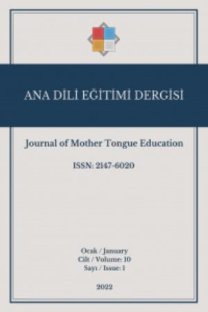Bakhtin’s Influence: Α Dialogic Approach to Teaching of Argumentation / Bahtin’in Etkisi: Argümantasyon Öğretiminde Diyalog Temelli Bir Yaklaşım
Bakhtin’s Influence: Α Dialogic Approach to Teaching of Argumentation / Bahtin’in Etkisi: Argümantasyon Öğretiminde Diyalog Temelli Bir Yaklaşım
Βakhtin, dialogue, argumentative text, writing primary school,
___
- Andrews, R. (2010). Argumentation in higher education. Improving practice through theory and research. New York: Routledge.
- Bakhtin, M. M. (1981). Discourse in the novel. M. Holquist (Ed.), The dialogic imagination (ss.665-678). Austin: Texas University Press.
- Bakhtin, M. M. (1984). Problems of Dostoevsky’s poetics. Minneapolis: University of Minnessota Press.
- Bakhtin, M. M. (1986). The problem of speech genres. C. Emerson and Holquist, M. (Eds.), Speech genres and other late essays (ss. 60-102). Austin: University of Texas Press.
- Bakhtin, M. M. and Medvedev, P. N. (1978). The formal method in literary scholarship. A critical introduction to sociological poetics. Baltimore: Johns Hopkins University Press.
- Clark, K. and Holquist, M. (1984). Mikhail Bakhtin. Cambridge: Harvard University Press.
- Cohen, J. (1960). A coefficient of agreement for nominal scales. Educational and Psychological Measurement, 20, 37-46.
- Derewianka, B. (1990). Exploring how texts work. Rozelle N.S.W: Primary Teaching English Association.
- Emerson, C. (1996). The outer word and inner speech: Bakhtin, Vygotsky and the internalization of language. H. Daniels (Ed.), An introduction to Vygotsky (ss. 123-142). London: Routledge.
- Gee, J. (2014). An introduction to discourse analysis. Theory and method. London: Routledge.
- Holquist, M. (1990). Dialogism.Bakhtin and his world. London: Routledge.
- Lave, J. and Wenger, E. (1996). Practice, person, social world. H. Daniels (Ed.), An introduction to Vygotsky (ss. 143-150). London: Routledge.
- Matusov, E. (2009). Journey into dialogic pedagogy. NY: Hauppauge, Nova Science Publishers.
- Miller, C. R. (1984). Genre as social action. Quarterly Journal of Speech, 70, 151-167.
- Morris, P. (1994). Bakhtin reader. London: Arnold.
- Rogoff, B. (1990). Apprenticeship in thinking. Cognitive development in social context. Oxford New York: University Press.
- Sfard, A. (1998). On two metaphors for learning and the dangers of choosing just one. Educational Researcher, 27(2), 4-13.
- Verma, G. K. and Mallick, K. (2004). Researching education. Perspectives and techniques. Tipothito–G. Athens: Dardanos.
- Vice, S. (1997). Introducing Bakhtin. Manchester: Manchester University Press.
- Vygotsky, L. (1978). Mind in society. The development of higher psychological processes. Cambridge: Harvard University Press.
- Vygotsky, L. (1987). Problems of general psychology. The collected works of L.S. Vygotsky. Vol. 1. New York: Plenum.
- ISSN: 2147-6020
- Yayın Aralığı: 4
- Başlangıç: 2013
- Yayıncı: Mehmet Kurudayıoğlu
Sait TUZEL, Smaragda PAPADOPOULOU
Nikoletta TSITSANOUDIS-MALLIDIS
Kenan BULUT, Fatma AÇIK, Ömer ÇİFTÇİ
